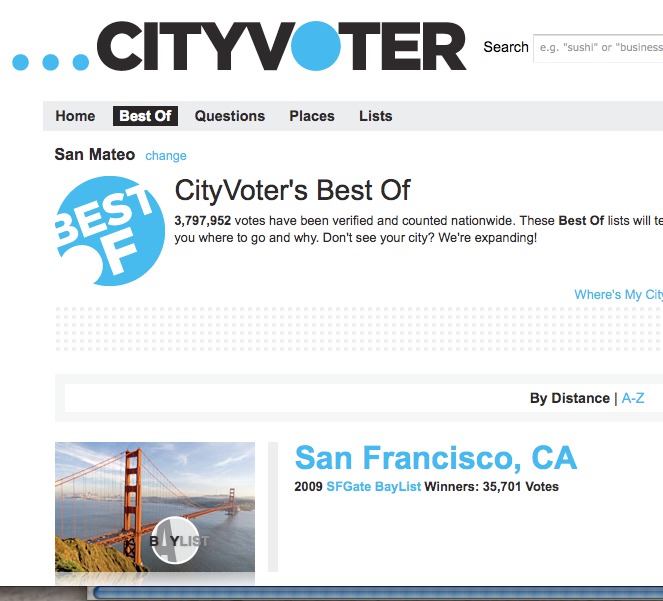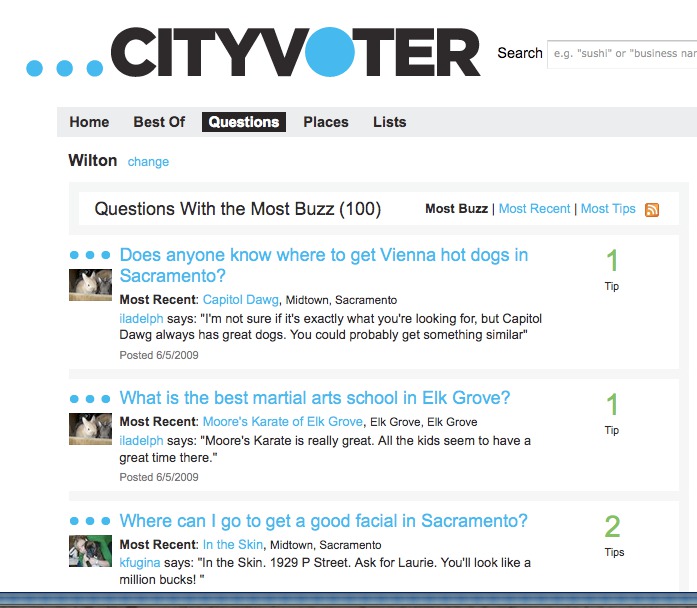"Best of" contests powered by CityVoter grow large scale traffic, revenues
“Best of” guides have become so competitive that some restaurants have awards from several different media hanging on the wall.
Enter CityVoter.com. Since launching five years ago, the company now powers contests in 28 markets, from broadcast companies just starting the contest, to newspaper sites re-energizing their "Best of" brand.
Still new to most cities, CityVoter gives its exclusive partners a competitive edge, allowing some broadcast companies to dominate the franchise in online space. Sacremento's KCRA-3 television, for example, now has more than 120,000 votes cast in eight weeks.
What’s new about CityVoter’s technology? Traditionally online “Best of” sites are copies of a contest that ran in a newspaper or magazine, with an online survey primarily acting as method of collecting votes. Because online voting is cheaper and easier to do (paper surveys take up a full page for eight weeks then a group of people has to sit around and tally the votes in 60 to 100 categories) many newspapers have already dropped printed survey forms.
CityVoter gives the contest a new twist by using the contest to create massive amounts of user-generated content and to keep interaction with voters and winners going all year long.
“We ask voters, why are you recommending this company?" says Josh Walker, founder and CEO of CityVoter.
"About 50% actually take the time to to write something about the business, and that creates a new comment, and aggregated, an enormous amount of content," he said.
"We have about 80,000 of these recommendations per city...The SEO is incredible because user-generated content is what Yahoo and Google are looking for.”
In a period of two months from voting through results some media sites have generated up to 5 million new page views from their annual readers poll.
The content stays on the site year round, in addition to being aggregated on the Cityvoter.com site.
Media also participate in a question-answer network; a box on the front of CityVoter asks, “Need a recommendation? Ask a question”. Voters who post also enter to win T-shirts and other shwag, so the media continues to accumulates e-mail lists during the year.
Some of the biggest CityVoter contest markets, Detroit, Sacremento and Seattle, are cities that have partnered for several years and now have 100,000 to 140,000 votes generated in the space of two months.
Offshoot contests also abound, such as Detroit’s WDIV TV’s “The Best Holiday Gift Guide, Created by You.”
ExerciseTV, which had a “Best of” contest for local personal trainers, used the contest to build a site with more than 1500 trainers.
The contests CityVoter powers typically generate six figure revenues and cost between $10,000 to $20,000, although in small markets Walker says he has sold the program for as little as $500 to $1000 a month with participation in the revenue share.
Originally CityVoter took a revenue share of advertising in all its partnership agreements. But since advertising revenue shares are “difficult to police”, the company has switched its model to “inventory share”, taking a percentage of the inventory and selling these premium spots through Quandrant One and Burst Media. There is also a small self-serve feature that charges a fee to small businesses who build their own micro-sites.
So far mostly broadcast sites with no established “Best of” brand have taken advantage of the opportunity.
“TV is a no-brainer. Its like a megaphone,” says Walker. “I’m still looking for the print that can activate as well as TV. Print companies tend to get caught up in Church and State issues.”
According to the Kelsey Group about half of the traffic from contests comes from the media, the other half comes through the CityVoter site.
“A new niche we are carving out is all the magazines across the country,” Walker says. The San Francisco Chronicle and Boston College’s student newspaper currently use the software.
Walker says the five year old company now has 12 employees, is venture capital backed and will break even in 2010.

The author, Alisa Cromer is publisher of a variety of online media, including LocalMediaInsider and MediaExecsTech, developed while on a fellowship with the Reynolds Journalism Institute and which has evolved into a leading marketing company for media technology start-ups. In 2017 she founded Worldstir.com, an online magazine, to showcases perspectives from around the world on new topic each month, translated from and to the top five languages in the world.











